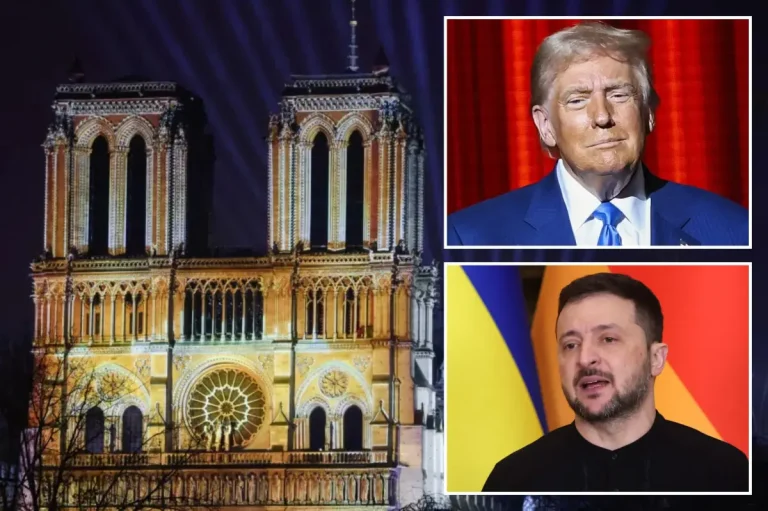- Macron aims to mediate between Trump and Europe.
- Concerns arise over Trump’s stance on Ukraine aid.
- Trump’s visit is seen as a symbolic return to the global stage.
U.S. President-elect Donald Trump will return to the world stage on Saturday, joining global leaders for the reopening of the Notre-Dame Cathedral in Paris. Although he remains a private citizen, Trump is already preparing to confront a range of international challenges. This marks his first overseas trip since winning the presidential election a month ago.
The event provides French President Emmanuel Macron with an opportunity to take on the role of mediator between Europe and the often unpredictable U.S. politician. Macron has embraced this role before, using diplomatic engagements to bridge gaps between different international powers.
As the ceremony unfolds, Trump’s presence in Paris could signal a new chapter in U.S.-Europe relations. The two leaders are expected to discuss global issues, despite Trump still holding the status of a president-elect. Macron may seek to understand Trump’s policies more clearly and explore opportunities for collaboration.
Though Trump’s visit is brief, it will highlight the ongoing dynamic between the U.S. and Europe as they prepare for the transition of power in Washington. Macron’s diplomatic skills will be tested as he navigates the delicate relationship with Trump ahead of his official inauguration.
The Notre-Dame reopening serves as an occasion for global unity, and both Trump and Macron will undoubtedly seize the opportunity to discuss key international matters. With Trump stepping onto the global stage for the first time since his election victory, the world will be watching closely to see how he engages with the European leader.
Trump’s plane landed at Paris Orly airport just before 0600 GMT on Saturday, according to French media reports. The two leaders are expected to meet during the visit, though no specific agenda for their talks has been announced. European leaders worry that Trump might withdraw U.S. military aid to Ukraine at a critical moment in its struggle to repel Russian invaders.
Macron strongly supports NATO and Ukraine’s defense, while Trump believes European nations should contribute more to their shared defense. He also advocates for a negotiated settlement to end the war in Ukraine.
Heather Conley, senior adviser to the board of the German Marshall Fund, which promotes U.S.-European ties, said, “Macron is repeating his personalized approach, which had some limited success during Trump’s first term. Macron understands that Trump values the pomp, circumstance, and grandeur of state, and he provides it to him in abundance.”
Trump will join dozens of world leaders and foreign dignitaries for the ceremony reopening Notre-Dame Cathedral, which had been devastated by fire 5-1/2 years ago.
It was unclear whether Trump would meet with other leaders besides Macron. The Trump transition team did not respond to requests for details.
Although Trump is set to be sworn in as U.S. president on Jan. 20, he has already held discussions with several world leaders. Meanwhile, his team is working to get up to speed on a growing list of global crises, including those in Ukraine and the Middle East.
Trump’s national security adviser, Mike Waltz, and Ukraine envoy, Keith Kellogg, met with Ukraine envoy Andriy Yermak in Washington on Wednesday, sparking speculation that Trump might meet with Ukraine President Volodymyr Zelenskiy in Paris.
Trump, a Republican, was president when Notre-Dame burned in 2019. He lost his 2020 reelection bid to Democrat Joe Biden but won back the presidency on Nov. 5 by defeating Biden’s vice president, Kamala Harris.
“Symbolically, both Mr. Trump’s presidency and Notre-Dame have been restored in approximately the same time period. His visit to Paris is also the opening salvo of his return to the world stage, further diminishing the final days of the Biden administration,” said Conley.
First lady Jill Biden will represent the United States at the Notre-Dame reopening.
GLOBAL SPECTACLE
Trump will generate significant worldwide attention as he stands alongside other global leaders. He visited France four times during his presidency from 2017 to 2021, including for the D-Day anniversary ceremonies in 2019.
“Trump will be seen throughout the world in a potentially statesman-like role,” said Republican strategist Doug Heye. “It’s not images of him at Mar-a-Lago,” he added, referring to the Florida home where Trump has spent much of his time since the election. “This is the biggest event in the world, and he’ll be on equal footing with other leaders.”
Observers will closely watch how Trump and Macron interact, given their complex relationship over the years. Macron invited Trump to the Bastille Day military parade in Paris in July 2017, which inspired Trump to organize his own military parade in Washington for America’s Independence Day in 2019. The two men also hosted each other at a White House state dinner in 2018, but their relationship soured the following year after disagreements over NATO.
“Trump coming to Paris is a ‘good coup’ by Emmanuel Macron,” said Gerard Araud, France’s former ambassador to Washington. “It is essential to have a direct relationship with the only man who counts in the Trump administration—Trump himself.”
During Trump’s first term, Macron pursued a non-confrontational approach, hoping engagement would lead to favorable concessions. However, policy disagreements on issues like climate change, taxation, and Iran created friction. By the end of Trump’s presidency, their relationship had become more contentious. Future clashes seem likely, fueled by Trump’s push for sweeping tariffs on Europe and other U.S. trade partners, as well as differing views on how to handle the Ukraine-Russia conflict.

